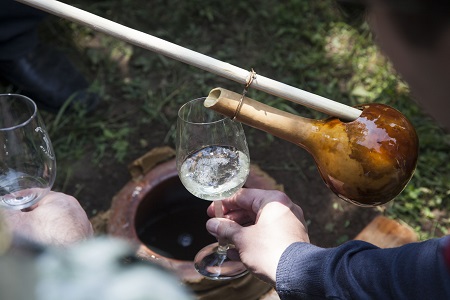FT Wealth: “Resurgence of Georgia’s viticultural heritage excited wine connoisseurs”


"In an austere sixth-century Georgian monastery in the south Caucasus surrounded by vineyards, bearded monks sing in soaring harmony over a hole in the ground. An oenologist in a white cape and carrying a ceremonial sword joins in, while a Russian film crew looks on with hushed awe. The monks unseal a huge clay amphora of new wine, buried up to its neck, in an ancient ceremony both sacred and festive. Poured into plain earthenware drinking bowls by a brother on one knee, the amber wine has a fresh, bounteous earthiness – cause, indeed, for song.”
With these words Maya Jaggi writes an informative and interesting piece about Georgia’s vibrant wine history and its treasured unique winemaking method, before describing the challenges the industry faced and its steps of revival.
Today Georgia’s wine industry is on a path of resurgence where, now recognised as a UNESCO as an intangible cultural heritage, the ancient winemaking method is celebrated, honoured and continuing, particularly in Georgia’s orthodox arena.
"Georgia is rediscovering its wine-growing heritage amid rising international support for its claims to be the cradle of wine. It has the oldest continuous viticulture in the world, dating back 8,000 years. A ceramic wine vessel decorated with grape motifs from about 6,000 BC was found near the village of Shulaveri. With 525 indigenous grape varieties, from Abistazh to Zerdagi, the country is also impressing global wine connoisseurs who have become jaded by growing conformity. As wine lovers enthuse over dry white Rkatsiteli – one of the world’s oldest known grape varieties – and red Saperavi, there is a tourism benefit in burgeoning wine trails.”
Read the full article here: www.ft.com
 Tweet
Tweet  Share
Share